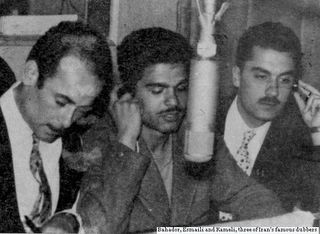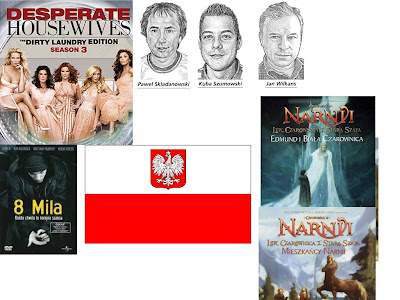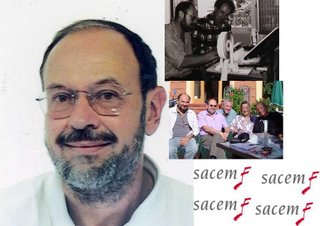
Bahador, Esmaili and Kameli, three of Iran's famous dubbers
Dubbing, Doubling, and Duplicity
http://www.pagesmagazine.net/2006/article.php?ma_id=7830018By: Hamid Nafisi
“Don’t be alarmed,” said a voice, “None of your ventriloquising me,” said the tramp.
H. G. Wells, The Invisible Man
Dubbing is the unsung hero of the history of world cinema. By making the movies intelligible to world populations, a majority of which was illiterate, it contributed immeasurably to the spread of cinema as the most popular entertainment form. It also contributed to the rise of the national cinemas and film industries. And it introduced its own poetics and politics, which impacted how cinematic stories were told and were transformed.
In Iran,
dubbing was lynchpin of the hybrid production mode, and it took two chief forms.
Dubbing involved an operation on foreign language movies by which Persian language dialogue replaced foreign language dialogue. Doubling involved an operation on locally made movies by which diegetic actors or voice doubles recorded the films’ dialogue in
post-production sessions. The separation of the characters’ voices from their bodies broke the tyranny of sync-sound, which was the sound equivalent of invisible editing, the armature of classical realist cinema style. And it provided ample opportunities for a range of not only
dubbing and doubling but also of duplicating and duplicitous practices, involving translations, mistranslations, substitutions, elisions, apparent losses, surprising gains, opportunistic accommodations, and censorship, contestation, and haggling of all sorts. As such,
dubbing—the general term applied to both
dubbing and doubling operations—is one of the most significant and signifying aspects of the pre-revolution Iranian cinema, during which it flourished.
Dubbing Foreign Movies
Ismail Kushan
dubbed the first foreign language movie into Persian, but not in Iran. During World War II, he had joined the Nazi Ministry of Propaganda in Berlin as producer and announcer of Radio Free Iran’s Persian Service and as
voice-over narrator of Persian language German newsreels, and he had played bit parts in German movies at UFA, the giant Nazi movie factory. His pro-German and anti-British broadcasts prevented him from returning home, forcing him to relocate from Germany to Turkey, where using Iranian students there he
dubbed into Persian Henri Decoin’s French comedy
Premier rendez-vous (1941) under the title Runaway Girl (Dokhtar-e Farari). Kushan had troubles finding women willing to act as
voice-over artists, but finally he engaged Nurieh Qavanlu to
dub the voice of the lead actress, Danielle Darrieux. In Turkey, he also
dubbed a second movie, a Spanish song and dance item,
La Gitanella, which he titled Gypsy Girl (Dokhtar-e Kowli). He carried both movies with him home at the war’s end, when he was allowed to return. He screened Runaway Girl for dignitaries and the general public in Tehran’s Crystal Cinema starting on April 25, 1946. The film’s 200,000 tumans box office and positive media publicity about Qavanlu’s
dubbing of the French actress’s voice was very encouraging.
Kushan’s Mitra Films released in 1948 the first Persian language talkie made inside Iran. Called Tempest of Life (Tufan-e Zendegi), it was produced, photographed, and edited by Kushan and directed by the German-trained theater director, Mohammad Ali Dariabaigi. Kushan surmounted many production, technical, and personnel problems, as in an artisanal fashion he performed not only these but also many other un-credited tasks for the movie. The result was a melodramatic, musical tearjerker in which true love won over arranged marriage, and hard work and perseverance transcended class inequality. The film was first shown in Rex Cinema to dignitaries such as Ashraf and Abdolreza Pahlavi (Shah’s sister and brother), preceded by a newsreel about the opening ceremonies of the Royal Social Service Clinic, headed by Ashraf, which Kushan had filmed. The novelty of the first Persian-language sound movie made inside the country brought many enthusiastic spectators to the theater.
The overall success of the initial
dubbed movies resulted in a flurry of activities to establish new
dubbing studios to take advantage of the public’s fascination with Persian language foreign sound films. Between 1949 and 1954 at least 8
dubbing studios opened in Tehran and other studios were opened in Italy, which had an advanced
dubbing industry. Together, these studios helped bolster the Iranian film industry and cinema. Dariush Film Studio in Italy, headed by the Armenian-Iranian Alex Aqababian, made a specialty of
dubbing Italian movies into Persian for the Iranian market. For his first effort, The Story of Miserable Feraidun (Sargozasht-e Feraidun-e Binava, Le Meravigliose Avventure di Guerri Meschino), Aqababian not only translated the Italian dialogues into Persian but also Persianized the proper names of the characters, including that of the protagonist in the title. Its screening in October 1952 in Tehran’s Diana Cinema was so successful than within a week Park Cinema also began showing it.
The bulk of the
dubbing took place inside Iran which, as Jamal Omid reports, by 1968 boasted some twenty-five
dubbing studios, 240
dubbers (170 males and 70 females), and a professional Film
Dubbers Union, which had began operation in 1965. Technical quality of the
dubbed prints continued to be a problem as were some of the liberties the film importers, distributors, exhibitors, government censors, and
dubbers took with the originals. Many of the technical problems were gradually overcome, but some of the aesthetic and ideological problems were exacerbated, leading to the emergence of certain poetics and politics. By the 1960s, foreign movie distributors and importers were providing
dubbing studios with music and sound effects tracks that were separate from the dialogue track, allowing the
voice-over artists to concentrate solely on their dialogue
dubbing and the
dubbed films to retain their original music and sound effects. Indeed, these voice artists became very proficient and prolific, the best of them specializing in
dubbing the voices of several foreign movie stars. As a result of their success, the number of
dubbed foreign movies shown in Iran continued to rise rapidly--56 films were
dubbed in 1957, 119 in 1958, and 183 in 1959. By the end of the 1950s it was rare to encounter a foreign movie that was not
dubbed.
Doubling Domestic Movies
Because of various production difficulties, almost all commercial features made in Iran were also doubled, that is, they were filmed MOS (without sound), with dialogues and sound effects both recorded and added in post-production. As a result,
dubbing and doubling became lynchpins of the entire commercial film industry, impacting production, censorship, importation, distribution, exhibition, and advertising of the movies. The institutionalization of
dubbing and doubling and their kin, lip-synching of actors to pre-recorded songs—as in Siamak Yasami’s Qarun’s Treasure (Ganj-e Qarun, 1965)—popularized commercial cinema movies and filmgoing and helped to improve both the technical capacity of the film industry and the construction of new moviehouses. However, it also had a profoundly negative impact on film production practices. One such consequence was that actors did not have to memorize their lines. This situation reinforced laziness, intuitive acting, spontaneous filmmaking, and the insidious idea that filmmaking was basically improvisational, requiring little preparation.
Until the end of the 1950s, Iranian actors had doubled their own voices in
post-production , but from the 1960s onward—the emergence of the hybrid production mode—most of them abandoned this practice in favor of professional
dubbers (called dublor from the French doubleur) doing their voices. These Professional
voice-over artists were both specialists and generalists and they were also prolific. Some of them specialized in
dubbing the voices of only certain foreign and domestic actors, while others
dubbed and doubled many different voices. They often indigenized (Iranianized) the foreign actors and stars by putting Persian language expressions in their mouths—continuing the function of live screen interpreters (dilmaj). This was particularly true of the comics and of the strong character types, such as cowboys, tough guys, outlaws, and romantic heroes and heroines. Sometimes, these efforts at indigenization were inappropriate, as when
dubbers spoke Burt Lancaster’s lines in a Persian Turkish accent or that of Tony Curtis’ in a Persian Rashti accent—both of which carried very specific cultural baggage not in the original. Also, because each
voice-over artist usually
dubbed and doubled the voices of several characters, foreign and domestic, strange transnational crossover resonances and dissonances would be set up between
dubbed voices and screen characters and between original and
dubbed films, which served to undermine the spectators’ mirror-phase identification with the foreign characters.
Thus,
dubbing became, as Natasa Durovicova notes, the great equalizer, a “machine for processing differences.” Nonetheless, some critics, such as Amirhushang Kavusi, rightly condemned these efforts as fraudulent and unethical because they violated the “authenticity and integrity” of the original films. However, audiences, particularly those from the lower classes seemed to like such transformations and equalizations, as they would draw special pleasure from hearing John Wayne and Jerry Lewis use expressions that Iranian tough guys or comedians used. This sort of cultural hybridity, brought on by
dubbing, on the one hand, subverted the original films and, on the other hand, endeared them to audiences whose film watching experience was thereby enriched. As a result, contrary to the pessimist culture industry critics, the “work” of these slippery and manipulative
dubbing and doubling practices was highly ambivalent, ambiguous, and sometimes even counterhegemonic for instead of providing wholesale interpellation and identification with Western movies and cultures, they created new movies and an alienating sort of identification. In addition, however questionable some of the specific practices of the
voice-over artists were, it is clear that by giving voice and personality to the actors and stars they brought them to life and provided incalculable service in popularizing cinema in Iran and in bringing enjoyment to audiences. Unfortunately, their individual services oftenwent unrecognized by both critics and audiences.
Dubbing is an unrecognized dimension of the orality of the Iranian cinema—and of the hybrid mode—for the oral tradition was strong enough among some of the
voice-over artists to drive their practices. Many came from radio, the most oral of the mass media, and some from the theater. The comic radio actors, such as Hamid Qanbari, transferred their various radio personalities into their film
dubbing, imbuing foreign actors, such as Jerry Lewis, with a new Iranianized personality beloved to audiences, who spewed specifically Persian expressions, or even jokes that were then current in Iran and on the radio. Thus, Jerry Lewis was always haunted by his indigenized double. As in Persian art music and oral storytelling, sometimes, the composition and performance of
dubbing occurred at the same time. Dialogue translators and
voice-over artists, forced to work within the confines of a time-based art such as cinema, resorted to improvisation and to the efficiency of inserting tried and true expressions in the mouths of the actors, much like oral poets who stringed together blocks of known formula phrases. Such reliance on improvisation and formula phrases probably aided the development, and the longevity, of typage in Iranian cinema. Once a type had emerged, such as country bumpkin, foreign bride, tough guy, or dandy, the voice artists ran with it. They did so by turning a foreign character into a local one, or by imbuing a local actor with more character than he visually displayed on the screen, or by typecasting him into a familiar, endearing, or tiresome character. The development of all the key characters of Qarun’s Treasure—Qarun himself, Happy Ali, Hasan the Rattler, Ali’s mother Zinat, Shirin, and Qarun’s purported Indian son, played by Ali—all owe something to these dynamics of orality,
dubbing, doubling, and typage.
Finally, any
dubbing is a form of translation and mistranslation, not just in linguistic terms but also in cinematic, sociocultural, and political registers. Like song and dance sequences, dubbing served narratively and politically important functions in the commercial cinema, which was bridled by heavy censorship. It offered the directors a second chance to smooth over their films’ narrative flaws and rough spots or to tie up loose ends. By adding a few words of dialogue or expository speech, they explained away or covered up ellipses, missing scenes, missing persons, or extraneous elements left in the movie because of improvisational filming. It also allowed them to censor their movies, papering over immoral relationships or politically sticky points. In this process, names of characters, lines of dialog, story lines, locations, and character relationships were manipulated and changed to make the films both palatable to public tastes and to government and religious censors. Through drastic manipulations of this sort during
dubbing, sometimes, a tragedy would be turned into a comedy.
Dubbing also served the causes of Iranian nationalism by encouraging linguistic homogeneity and reducing heteroglossia and the “Babel effect,” so feared by religionists and ultranationalists. This is how Persian became the dominant language not only of national cinema but also of television, all of whose programming—a large portion of them imported—were
dubbed.
After the Islamic Republic,
dubbing of foreign movies became more of a politico-religious instrument for censoring films, consciously employed to cover up scenes that due to their perceived immoral Western content or incorrect politics were altered or removed, creating new story lines, character relationships, and politics. For example, through
dubbing and cutting, the sexual relationship of unrelated men and women in foreign movies—illegal in Islamic Iran—would be changed to sibling or friendly relations. Verbally, the lovers would be called brothers and sisters or friends, and to avoid incest taboos, images that suggested sexual relations would be removed by cutting. Such changes would have major repercussions for the entire movie, requiring many other changes to make the story seamless and coherent. Without those fine-tuning changes throughout, the movies’ intelligibility would be compromised, which was the case in many instances in the early days of the Islamic Republic. Similar strategies were applied to change and to manipulate the films politically. Because of its vast possibilities,
dubbing provides a rich arena for deciphering the tensions of hailing and haggling, and of selfing and othering.
Doubling of the Iranian movies decreased enormously within a decade after the Revolution, as the government began to encourage sync sound filming by providing more funds, or more raw stock at lower prices, to the filmmakers who took that option. As a result, most of the art cinema films were shot with sync sound on location, a practice that enhanced the realism of the postrevolutionary movies.
Hamid Nafisi is Professor of Film and Media Studies, Department of Art History, Rice University, Houston, Texas. He has Published extensively about theories of exile and diasporic cultures, films and media; and Iranian, Middle Eastern, and Third World cinema.
(The copy right of the article 'Dubbing, Doubling, ' is held by its author.)
Labels: dubbing, dubbing agency, farsi dubbing, farsi voiceover, film dubbing, foreign language, iran, persian dubbing, recording, studio, subtitling, translation, voice over, voice talent, voiceover










